|
| |
| |
| |
From Hereditary Authority to Individual Charisma
The Monarchy in Belgium
Some months ago, I watched a documentary on Thomas Jefferson by the famous director Ken Burns on the A & E Channel. I was struck by the strong idea of republican self-government, which formed the basis for Jefferson's political commitment to the American Revolution. This same idea also determined his opposition to the federalist tendency after the revolution. Federalism might create a new strong government, which would match the tyrannical monarchies of the Old World. Watching this documentary, I realised how strange it must be for an American today, to be confronted with the existence of a monarchy in our time.
Of course the current Belgian monarchy doesn't in any way resemble the ‘tyrannic rule’ of the British King George iii against whom the Americans revolted at the end of the eighteenth century. It has adapted itself and assumed a more modest role in modern democratic life. This was obviously the concession the monarchy had to make in order to survive. It might, however, still be viewed as an anachronism in a modern democracy. Inherited authority doesn't fit well into our conception of democracy, equality and merit. The current public discussion about the competence of the Belgian crown prince sheds a strange light on the anomaly which put kings on the throne because of their fathers and not because of their political support, their moral, intellectual or political skills. This feudal character of transmittance of authority can also be illustrated by the fact that it was only in 1991 that the rule limiting the right of succession to the Belgian throne to male descendants was changed.
These considerations contrast very strongly with the broad support for the monarchy in Belgium. As a matter of fact, the Belgian monarchy is currently very popular. This was very clear from the reaction to the death of King Baudouin in the summer of 1993. The massive outpouring of sympathy for the deceased King surprised many observers of Belgian political life. At the accession ceremony of King Albert ii, the libertarian deputy Jean-Pierre van Rossem who shouted ‘Long live the republic’ - imitating the words of the communist leader Etienne Lahaut in 1950 - was rejected by politicians as well as by public opinion. Those who openly oppose the monarchy in Belgium are indeed very marginal. They are small movements and some
| |
| |
isolated public law scholars. The Socialists, who used to be republicans before 1914, have long since dropped their anti-royal discourse. Even at the time of the so-called ‘Royal Question’ right after the Second World War, the monarchy itself was not in danger. Only recently, at the end of 1997, the Volksunie, one of the smaller Flemish parties, questioned the monarchy as institution. But it very quickly dropped any reference to this issue when it realised that no extra votes would be attracted, quite the reverse.
| |
A republican monarchy
The Belgian monarchy and the current dynasty date from 1831. They are as old as the Belgian state. As a matter of fact, the Belgians who made their revolution in 1830-1831, when they seceded from the union with the northern Dutch provinces - a union created by the great powers at the Congress of Vienna in 1815 - didn't feel any enthusiasm for a monarchy, although only a minority of the National Congress voted for a republic. Like the American Revolution fifty years earlier, the Belgian revolution was a true liberal revolution, and shared the same values of liberty and self-government. However, in 1830 the fear of repression by the great powers in a Europe dominated by the so-called Restoration determined the Belgian revolutionaries to opt for a monarchy. But they restricted it as much as possible. Eventually they elected the German prince Leopold of Saxe-Coburg as the new King. As the widower of the British crown princess, he was strongly supported by the British. The French also accepted him, since he promised to marry the daughter of the French King.
Leopold didn't fail to reproach the Belgians for the limitations they put on the monarchy. ‘Dear Sirs’, he answered the committee which offered him the Belgian throne, ‘You have treated the monarchy, which was not present to defend itself, badly. Your constitution is quite democratic. However, with some compliance on both sides, it is still possible to proceed’. The Belgian National Congress had indeed created a parliamentary government. According to the constitution of 1831 the King would be head of the executive power. He was, however, called ‘inviolable’, and his ministers would be held responsible before parliament; no act of the King could be executed unless it had the counter-signature of a minister, who assumed responsibility for it. Thus, the prerogatives of the King as head of the executive power were actually prerogatives of his ministers.
But let us be clear from the beginning: reality didn't match constitutional theory. From the very start King Leopold i, who, in his inner circle, repeatedly called the Belgian constitution ‘absurd’, established some customs which gave him more influence than the founders of the new state had envisioned. He established a personal diplomacy and he took personal command of the army. In assuming this role, he was helped very much by the chaotic events following the Dutch invasion in August 1831. Leopold, who had been educated in the German tradition of enlightened despotism, considered foreign policy and army command to be within the natural realm of competence of a prince and he would continue to fulfil his diplomatic and military role. The influence of the King went even beyond diplomatic and military affairs. Unlike the British monarch, he presided over cabinet meetings.
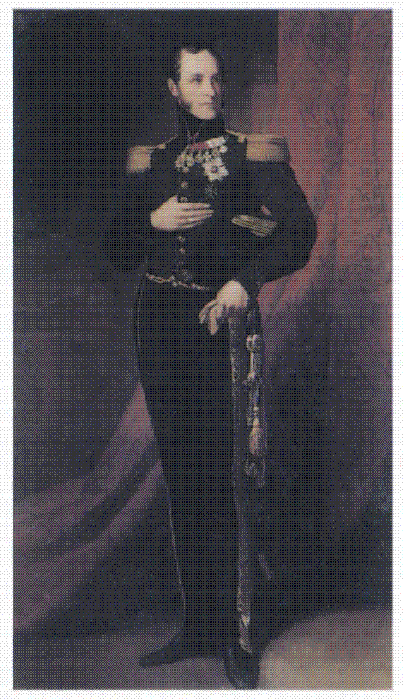
Ary Scheffer, Portrait of King Leopold I. 1838. Canvas, 230 × 134 cm. Royal Collection.
| |
| |
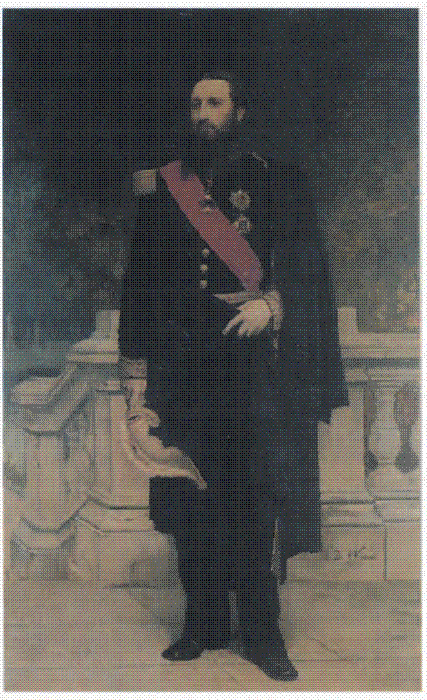
Lieven de Winne, Portrait of King Leopold II. Undated. Canvas. 242 × 150 cm. Royal Collection.
This gave him the opportunity to influence general policy. The actions of the King were real, but mostly hidden from the public, for the principle of inviolability forced his ministers to take responsibility for the King's actions.
In short, the role of the first kings in Belgian politics proved to be important and sometimes decisive. Leopold i (1831-1865) contributed greatly to the consolidation of Belgian independence and its economic development, which made Belgium into a respected industrial power. His son, Leopold ii (1865-1909), created an African empire for the Belgians. The influence of the King was due to the general elitist character of politics in the nineteenth century and the lack of strongly organised political parties. Moreover, until 1914 monarchy was the most common form of government on the European continent.
| |
King Albert and the Great War
The collapse of the German, Austrian and Russian empires at the end of the First World War and the emergence of strong Socialist parties ended the Old Regime in Europe. Belgium, however, succeeded in making a peaceful transition to mass democracy. General suffrage for men was introduced in 1919 and the Socialists joined a cabinet of national unity devoted to the reconstruction of the country. Instead of threatening the position of the monarchy, the war and the post-war period consolidated its position and Albert i (1909-1934) was the first Belgian monarch to become really popular. The war created the powerful myth of the King-Knight who had lived the life of his soldiers at the front. Of course, the fact that King Albert i returned to the capital as the commander of a victorious army played a major role in this. But there was more. A decisive factor was the personal involvement of the King in the formation of the first post-war cabinet, the so-called Loppem cabinet. In this cabinet of ‘national unity’, the Catholic Right, which had firmly held a parliamentary majority since 1884, had to yield territory to the Liberal and the Socialist Left. Albert i strongly supported this government. He had deliberately chosen to separate himself from the Catholic majority and wanted to implement a policy of reform in order to integrate the Socialists into the regime and, of course, to secure the position of the monarchy. In so doing, he tried to avoid an identification of the monarchy with any one party.
If all historians agree that Albert's personal policy did much to reconcile the Socialists with the Belgian regime, his attitude towards Flemish emancipation, generally referred to as the ‘Flemish Question’, on the contrary raises more controversy. Some historians argue that it laid the basis for the disintegration of the country. The emergence of mass society starting at the end of the nineteenth century was a major turning point in the language issue. Since the scope of education, military service, suffrage was broadened and made compulsory, the Belgian establishment could no longer ignore half of the population which didn't use the French language. The government was forced to deal with the Flemish Question more and more. It would become one of King Albert i's major obsessions. There were two possible solutions: overall bilingualism, or a division of the country into two unilingual regions. It must have been possible to envisage this last solution,
| |
| |
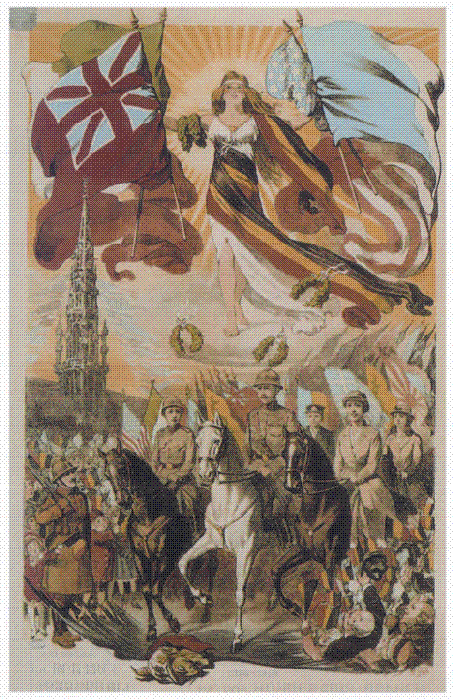
Poster announcing the return of the glorious King Albert i and Queen Elisabeth to Brussels in 1918 (Koninklijk Museum van het leger en van de krijgsgeschiedenis, Brussels).
favoured by the Flemish Movement, without viewing it as a threat to Belgian unity. But the First World War compromised this kind of solution. Indeed, one of the major war aims of Germany was to weaken if not to destroy Belgium. In order to achieve this goal the German occupier used the Flemish discontent and created a movement, called the Flemish activist movement, which promoted language reform and administrative division of Belgium and eventually proclaimed Flemish independence.
After the war the victorious Belgian establishment was not prepared to give way to Flemish demands. King Albert i was personally responsible for the slow and truncated way in which the major Flemish demands were met.
| |
| |
Already during the war the King opposed measures which could have reconciled the Flemish Movement with the Belgian state. He only agreed to promise ‘equality in fact and in right’, which proved to be an empty slogan. In the twenties he rejected the language reforms of the moderate Flemish Catholics. And in 1932 he still threatened Prime Minister Renkin that he would refuse to sign the law on the use of the Dutch language in the administration for, in his opinion, it would endanger the country's unity, which he was obliged to defend by his oath of accession. He eventually dismissed the cabinet. This was the third time that he used this constitutional prerogative. The public was, of course, unaware of all this.
| |
Leopold III and the Royal Question
Leopold iii, who succeeded his father in 1934, is closely connected with the dramatic events of the Second World War, which eventually led to his abdication in 1951.
At the time of the Liberation of Belgium in September 1944 the King, who had been a prisoner of war during the occupation, was not present in the country. He had been taken away by the Germans and imprisoned in Austria, where he would eventually be liberated in May 1945 by the Americans. The central issue in the Royal Question, which divided the country from 1945 until 1950, was the question whether the King could return and resume his constitutional prerogatives. The issue arose from the controversial behaviour of the King at the beginning of the war and during the German occupation. Actually, its origins went further back in time and stemmed from an authoritarian tendency in the thirties, which had also affected Leopold iii. Before the war, indeed, King Leopold iii didn't hide his growing discontent with parliamentary politics. He publicly blamed the political parties for putting their own interests before those of the state and he tried to restore strong government. In so doing the King was in tune with his time. Public opinion called for a more stable and strong government and looked to the King as the natural centre of authority. Since Europe in its entirety was facing a crisis of parliamentary democracy in the thirties, the King's authoritarian tendency was widely accepted.
This personal appeal to the King turned into a disaster as a result of the war. When the war broke out the King took command of the army. He hereby ignored his ministers, which led to the dramatic split between the King and the cabinet on 24 May 1940. While the ministers decided to continue the war with the Allies and to flee to France, the King decided to stay in Belgium; he was convinced that Belgium was a neutral country and had done its duty. On 28 May, he surrendered the almost defeated Belgian army to the Germans and presented himself as a prisoner of war. He was accused of treason by the French and the British and also by his own ministers.
This fatal decision, which the King defended as a military one, was actually essentially a political act. As a matter of fact, Leopold iii accepted the German New Order in Europe, but hoped to restore Belgian sovereignty, albeit limited, and therefore tried to negotiate with Hitler. In the domestic order, this new Belgium would reject parliamentarism and favour strong government. For this purpose, a revised constitution was drawn up at the King's
| |
| |
request. The tragedy of these events lies in the fact that Leopold iii acted as a Belgian patriot. All of this remained secret. Only after the war, in the midst of the controversy and the polarisation, did some of these elements become public; but even then they remained surrounded by mystery, denial and polemic, so that public opinion lacked a clear picture of events during the war.
After the Liberation it was impossible to defend the cause of the King by referring to his ‘inviolability’, since only the King was responsible for the decisions taken during the war. One could only hope that some common sense and some opportunism from both sides would pave the way for a national solution. Yet the King prevented a national reconciliation. In his political testament, written in 1944, he asked for a vindication of his honour and requested that the ministers who had blamed him in 1940 be removed from office. At the same time, he continued to show his preference for strong government. When the King was liberated in May 1945, the Belgian government didn't want to take the responsibility for his return.
This issue divided the country for six years: the Catholics advocated the unconditional return of Leopold, the Socialists wanted his abdication. A referendum held in March 1950 showed 57% in favour of his return. But this majority existed only in Flanders and not in Wallonia or in Brussels. When a Catholic government eventually brought back the King in July 1950, a revolt forced him to abdicate only one month later in favour of his son Baudouin.
The origin of the Royal Question lies in the fact that the King publicly assumed a personal role in politics. So he became the centre of controversy. The affair proved that the founders of the state had been very wise when they had written the inviolability of a non-elected king into the constitution.
As a result of the Royal Question Leopold iii has been contrasted with his father. Albert i was victorious in the Great War and favoured democracy. Leopold iii by contrast was portrayed as attracted to authoritarian rule and capitulated in 1940. There is a difference due to the context. But there is also a surprising continuity, due to the nature of the Belgian monarchy itself.
We now know that in the last years of his reign, Albert i despised the political parties and the parliamentary regime. The reason for his eventual disappointment was the realisation of the moderate Flemish programme, which implemented the unilingualism of Flanders, and which he was not able to prevent. He advocated a more authoritarian interpretation of the Constitution (‘the King appoints his ministers, not the parties’). His son followed in his footsteps and from the very beginning blamed the political parties for having lost the idea of national interest. But unlike his father, Leopold made his discontent public.
It is surprising that the monarchy managed to survive the Royal Question. Decisive in this was the role of Leopold's brother, Prince Charles, who was acting head of state during the period 1944-1950. He had been involved in the Resistance, maintained good contacts with the American and British allies and with the Left. But more conclusive in its preservation was perhaps the prospect of the problems which would arise in devising a new regime in such a strongly divided state. The Socialist Prime Minister Van Acker made the following statement: ‘I am a republican, but Belgium needs the monarchy like man needs bread’.
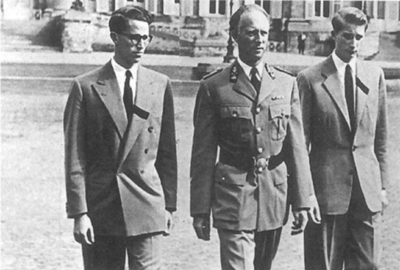
King Leopold iii (m.) and his sons Baudouin (l.) and Albert (r.) in 1950.
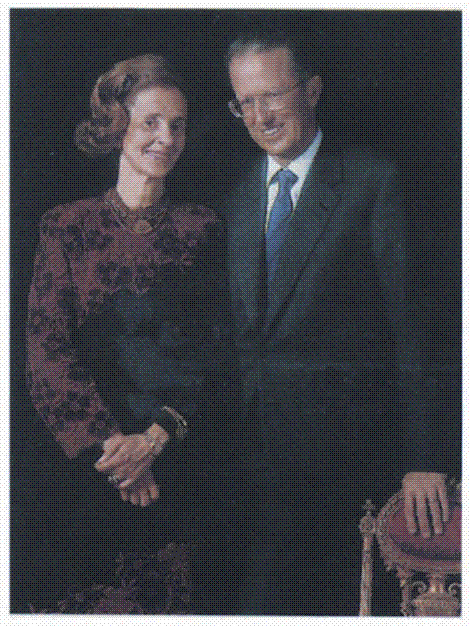
King Baudouin and Queen Fabiola
| |
| |
| |
King Baudouin, a stubborn advisor
The abdication of King Leopold iii in favour of his 21-year-old son Baudouin naturally dealt a blow to the monarchy in Belgium. The vacuum created by the weakened position of the head of state was filled by the political parties, who became the real decision-makers in the country. In some sense the Royal Question contributed to the phenomenon known since the early sixties as ‘particracy’.
King Baudouin was seen as amenable in his dealings with the politicians who had placed him on the throne. Throughout his entire reign Baudouin respected the constitution, with the single exception of the abortion issue, and he never attempted to take decisions on his own authority. But he succeeded in building up a great moral authority; partly because of his long reign and remarkable personality, but partly also because of the vicissitudes of Belgian political history over recent decades. He saw his popularity increase, not least through his marriage to the Spanish countess Fabiola di Mora y Aragon; she brought more warmth and spontaneity into the Palace and had a positive influence on the King's image. His attitude to the political establishment, however, was always typified by a certain aloofness and unease.
At first there was even talk of a coolness between the Palace and the political world. The reason for this was the continuing influence which King Leopold was thought, rightly or wrongly, to exert on his son. For Leopold and Princess Liliane still resided at Laken Palace with Baudouin. It was said that their talk there was scarcely conciliatory. Baudouin himself had been deeply hurt by the way his father had been forced into abdicating. In 1952 he provoked a diplomatic incident by refusing to attend the funeral of King George vi. His reason for this lay in the strained relations between his father Leopold and the British King resulting from the latter's attitude to the Royal Question. And though after the 1954 elections Baudouin did ask the Socialist Party leader Max Buset to form a government, he refused a ministerial appointment to the Liberal politician Charles Janssens, who had insulted his father at a public meeting. There was a whole string of such incidents, until the Eyskens government intervened and in 1959 reached an agreement with King Leopold that he should move to the Chateau of Argenteuil. But in the summer of 1960, following the declaration of independence of the Belgian Congo on 30 June, Baudouin still tried - probably under his father's influence - to force the Eyskens government to resign so that he, with an emergency cabinet, could settle the crisis in the Congo and safeguard Belgian interests and those of the monarchy in the former colony. His attempt failed. Traditionally, colonial policy had been made by the King. The loss of the African colony thus dealt a further blow to the position of the Belgian monarchy.
Moreover, the settlement of the Congo crisis made it plain that the King was no longer at the centre of power. Apart from his role in cabinet formation, after the Second World War the head of state gradually lost the instruments which had in the past ensured his genuine participation in political decision-making. King Baudouin presided over his Council of Ministers only twice, and after 1957 the custom disappeared for good. Once so decisive for the influence wielded by his predecessors, it no longer accorded
| |
| |
with the spirit of democracy. In military and foreign policy the King had to give up his previous position of influence, playing thenceforth only a modest role. As early as 1949, even before the Royal Question was settled, a parliamentary commission abolished the King's military command in wartime. The King's traditional influence on foreign policy was systematically whittled away by international cooperation and then by European integration. The following incident is significant here. In 1953 General Van Overstraeten, former advisor to Leopold iii, tried to obstruct Belgium's integration into the European Defence Community by publishing the war diaries of Albert i. These diaries made it abundantly clear that during the First World War the respected King-Knight had barred Belgium from joining the Allied Powers. His object in doing so was not only to protect Belgian independence, but also to safeguard the position of the monarchy. By publishing the diaries Van Overstraeten sought to achieve the same ends. If Baudouin's influence on military and foreign policy systematically declined, his influence on the appointment of officers and diplomats remained very great.
Baudouin also lost the two powers which in constitutional theory were the prerogative of the sovereign: the right to dismiss ministers and the right to dissolve Parliament. Following the British model, those powers were in practice transferred to the Prime Minister. The last attempt by the King to dismiss a cabinet was in 1960, on the occasion of the above-mentioned Congo crisis. Premier Eyskens then refused the King's request that he should tender his resignation. Baudouin did not insist. King Baudouin did, however, retain the right to refuse to accept a government's resignation. He used it regularly, and thus helped to determine the course of Belgian politics. Moreover, through his intensive contacts with his Premiers, ministers and a range of authorities King Baudouin continued to exert an influence which, albeit of a more long-term nature, is difficult to estimate.
The gradual constitutional reform which led in 1993 to Belgium becoming officially a federal state has encroached further on the position of the King. This new structure of the state marks the provisional end of a process of reform which occupied virtually all Baudouin's reign. Baudouin argued consistently for national unity, in line with his constitutional duty. But he was unable to prevent the gradual erosion of central authority, and thus also of his own position, by the successive stages of constitutional reform. At the time of his accession in 1950 inter-community problems were already acute. For coupled with the Royal Question was a sharp difference of opinion between Flanders and Wallonia, and fears that the country would disintegrate played a major role in its settlement. Already in the fifties Baudouin was concerned about possible separatism, and more so after the great Walloon winter strike of 1960-1961. This strike, against the Eyskens government's recovery plan, inflamed the Walloon Socialists in particular and radicalised the Walloon movement. To combat the centrifugal forces Baudouin supported the alliance between (Flemish) Christian Democrats and (Walloon) Socialists. His preference for this coalition, for which he was on occasion reproached by the Liberals, was a textbook example of ‘reasons of State’: this coalition better ensured the stability of the kingdom. As early as the sixties Baudouin was pressing the politicians to find a swift and global solution to the community issue, but he would eventually have to concede in frustration that even at the end of his reign there was still no consensus on the new
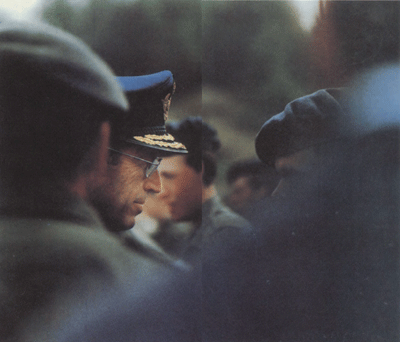
King Baudouin inspects the troops.
| |
| |
constitution. Only after long hesitation did he accept federalism. But his attitude to cultural autonomy was positive from the start, and later, in 1988, he had no difficulty in accepting the transfer of education to the communities. He had, though, a great fear of regionalisation, which he saw as a threat to the economic and monetary unity of Belgium. In 1988, when a large-scale transfer of powers from national to regional governing bodies was being organised, he was to resist this operation in vain. He was also critical of the federal handling of foreign policy which was then being worked out. The King no longer had any power over the regional authorities. From 1980 on, the regional governments were virtually republican in character and were wholly outside his influence. The dismantling of the unitary state thus had a huge effect on the position of the monarchy. Baudouin's plea for Belgium was in fact a plea also pro domo.
Regionalisation and internationalisation, together with the complicated decision-making inherent in modern government, all by their nature tended to erode the monarchy. But there were also forces working the other way. From the seventies onwards, the fragmentation of the party system led to a marked instability in Belgian politics. This was further exacerbated by differences between the parties on the implementation of regionalisation, and by the precarious economic situation which the political classes were powerless to deal with. Particularly after 1978, this produced a situation in which government was almost entirely lacking. As a result the King, as a stabilising factor, came closer once more to the centre of politics. There was a section of Belgian public opinion, certainly of thinking Belgian opinion, that saw in him the last chance of holding the country together.
The forming of a government has traditionally been one of the moments when a King could exert his power, and that remained the case under Baudouin; although after the Second World War the ruler had to take account of ever more factors and actors, with consequent marked narrowing of the room for personal action. In some cases Baudouin's own preference was decisive in appointing the person to form a government, and so the Prime Minister, and his judgment played a part in the choice of a coalition. And precisely in the crisis years of 1978-1981 King Baudouin's role in cabinet formation became, willy nilly, more pronounced. For the government crises were lasting longer and longer. During those years he pressed strongly, first for a government that would be capable of carrying through the constitutional reform, then after the 1980 reform for a government prepared to tackle economic recovery. In both instances, from 1978 on he put his trust in the Flemish Christian Democrat Wilfried Martens - a trust which he would maintain for more than ten years. Even in 1988, during the longest government crisis Belgium has ever known, at a time when the parties and public opinion alike regarded Martens as a spent force, the King brought back the Christian Democrat as Premier. While the King's role after 1978 was more visible than before, his actions were in the first place those of an advisor, a stubborn advisor whose words were not always heeded.
Baudouin fulfilled his task with great conscientiousness. Only those who knew him more intimately were aware that this sense of duty was rooted in a simple but deeply felt Catholic faith. Baudouin and Fabiola drew their inspiration from the charismatic movement to which they had been introduced by Cardinal Suenens. This religious commitment was an aspect of
| |
| |
Baudouin's personality unknown to the outside world. At his funeral Cardinal Danneels called it ‘the King's secret’. Baudouin's austere, even ascetic way of life, his concern for the children, the developing countries and later for the Fourth World, the migrants and prostitutes - an almost literal translation of the Gospel - contributed to the image of a prince of high moral principles and integrity, raised above the turmoil of politics, and brought to the fore the latent contrast between public opinion and the political world. It gave an almost religious, mythical dimension to Baudouin's actions. The contrast was greatly increased by the growing atmosphere of scandal surrounding Belgian politics during the eighties and it reached a peak with the settling of the abortion issue. Here Baudouin finally allowed his personal views to prevail over his constitutional role, at the risk of losing his throne. King Baudouin's objections to liberalisation of the law on
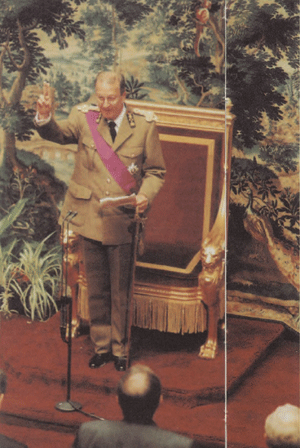
King Albert ii swears the oath in 1993.
abortion had long been known, but still it came as a surprise when in April 1990 he withheld the royal assent, refusing to sign the text of the abortion bill approved by the Chamber and the Senate. Premier Martens successfully defused this explosive situation by a constitutional device. The government declared the King ‘incapable of ruling’ for a few days and itself ratified the legislation. Although a majority of the population had previously expressed itself in favour of liberalising abortion, a large majority still supported Baudouin's action.
Baudouin's conduct during the abortion issue broke a taboo. Not only Baudouin but the monarchy itself became a topic of debate, and not just among free-thinkers. And the controversy about the King increased further when it became known in September 1990 that at his insistence the government had sent troops to Rwanda to support the Catholic but contested President Habyarimana.
Baudouin's sudden death in the summer of 1993 unexpectedly brought his younger brother Albert to the throne. Unexpectedly, because for many years Albert's son, Prince Filip, had been trained to succeed Baudouin. But the unmarried prince, whose competence had been called into question by a number of observers, was an uncertain quantity in a kingdom which was already unstable. One can safely assume that both the government and the royal family wanted to avoid running the slightest risk. And in 1991, at Baudouin's instigation, the government had modified the constitution so that in future women too would be eligible for the throne. This change opened the way for Princess Astrid, Filip's younger sister, who was more likely to match up to expectations. In 1993, then, the succession question was postponed indefinitely.
It was generally expected that Albert and Paola would find it hard to equal the prestige of Baudouin and Fabiola. Prince Albert's more worldly lifestyle was not exactly marked by the asceticism of his dead brother. But Albert immediately stepped into Baudouin's shoes and before long had made an impression of reliability. In this he received unwished-for help from the affair of the missing and murdered girls which came to a dramatic head in the summer of 1996, rocking Belgium's political institutions. Albert took several notable measures to help the stricken families and attempted to restore public confidence in the justice system. Such public action was and is not without its dangers, however. While the sovereign has absolutely no political responsibility, his intervention - even with formal government ap- | |
| |
proval - risks deepening the dangerous gulf between public opinion and government and increasing its distrust of politicians.
Be that as it may, since 1993 the position of the King has not been what it was under Baudouin. The constitutional reform of that year which sought to combat political instability also touched for the first time on the provisions regarding the head of state; more specifically, it restricted his role in appointing and dismissing ministers. On top of this, the roles of the King and his ministers have again been reversed: since his accession the less experienced King has found himself facing a Prime Minister of consequence. Finally, the controversy about the monarchy itself which was ignited under Baudouin has not died down, and a question mark still hangs over the issue of the succession. And this brings us back to where we started. The monarchy can rely on broad support, but there is something strange about it. Its survival no longer depends on the vanished splendour of hereditary authority, of the institution as such, but on the individual who embodies it.
emmanuel gerard
| |
Bibliography
| molitor, andré, La fonction royale en Belgique. Brussels, 1994. |
| stengers, jean, L'action du roi en Belgique. Pouvoir et influence. Brussels, 1997. |
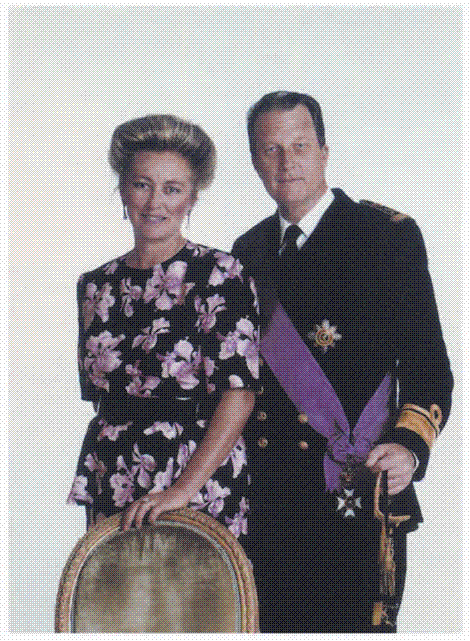
King Albert ii and Queen Paola.
|
|